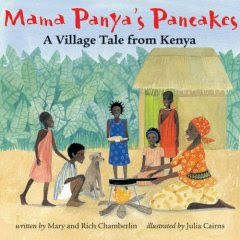Tuesday, 29 January 2008
Geography & Food: starting from stories
Monday, 28 January 2008
Workshop: Geography & Food
The PowerPoint that I used to summarise the focus of my planning is shown below:
There are a number of projects linked to food and farming on the Oxfam Education website, including Making a Meal of It. Activity 5: Unpacking the supermarket bag is referred to on slide 6 of the presentation.
There are lots of links to online materials for teaching about food. Some are strongly geography focused while others focus more clearly on other curriculum areas, e.g. science. I'll be sharing some of these links on this blog over the next few weeks. If you have successfully taught geography through a food topic why not contribute your ideas.
Reflections on a Primary Cross-Curricular & Creativity Conference
On Friday 25th January I took part in a conference for a pyramid of Wakefield schools. What follows are a few of my thoughts linked to the keynote presentation.
The first thing that strikes me is the influential role of some of the independent educational consultancies in shaping the direction that primary schools take when reviewing their curriculum. In this case our conference was led by a well regarded keynote speaker from a prominent commercial education consultancy.
[I want to return to two of these areas, i.e. the ones that relate to assessment in geography and to Global Warming in a later entry.]
So, do the solutions to the primary curriculum lie with the published advice and guidance that commercial educational organisations provide or do the solutions lie with teachers in the classroom who know their pupils and want to provide a curriculum that starts with the child and takes into account the needs of the child and the community in which the child grows up?
Wednesday, 23 January 2008
Books & websites for developing an understanding of Global Citizenship and Education for Sustainable Development
 It was great to meet so many enthusiastic teachers at yesterday's Quality Geography Conference in London.
It was great to meet so many enthusiastic teachers at yesterday's Quality Geography Conference in London.One of the things we discussed was using books as starting points for learning in geography and I offered to make a book and website list available through this site. Click on the link below (green text) to access a WORD document which lists a selection of books and websites on the theme:
Global Citizenship and Education for Sustainable Development
Sunday, 20 January 2008
Young Geographers - access to Word documents

The Word documents that were shared on the first day of the Young Geographers Project in Sheffield can be accessed by clicking on the highlighted link.
See below for access to PowerPoint presentations from the day.
Saturday, 19 January 2008
Planning with `big ideas'
Currently KS3 are being asked to focus their planning for geography around key concepts. Paula Owens (my job share partner) and I have been thinking about whether a similar approach could be useful in the primary school. We believe that the use of `concepts' as a planning tool might help ensure that geography does not disappear from the curriculum if schools move towards cross-curricular approaches to learning.
The second half of the presentation shows `Living Geography' in action in school.
The last three slides provide guidance for project members on the format for writing up their materials to be included on the GA project page - Young Geographers
Primary Young Geographers Project
Additional information will be shared via the main GA project page website:
We had a very succesful first day yesterday which helped to get the project off to a very positive start. Through the project we are empasising four main elements:
· Engaging in practical 'curriculum making'
· Capturing the sense of motivating 'living geography'
· Learning Outside the Classroom
· Education for Sustainable Development
My introductory presentation was designed to promote reflection on what we might mean when we talk about `Living Geography' and what kinds of activities teachers are using to develop this approach in the primary classroom.View `Living Geography' presentation.
The notes that follow may help you to make sense of some of the thinking that went into the presentation:
- Who am I? Why focusing on `identity’ is a valuable place to start when thinking geographically.
· The link between place and identity, i.e where we grow up is a key factor in shaping our identity
· The importance of engaging young people with their own place and supporting them to explore their feelings about the place – Quikmaps example,
· Involving young people in `changing places’ – the importance of feeling that you can make a difference to your community, learning how change happens, what’s involved, making change happen (making learning real - not just another `school' activity)
· The importance of geographical imagination to the way we think about `place’ – location, first hand-experience, the way the world is represented to us and our emotional response to places are all important factors in shaping our geographical imaginations. Actual journey’s (fieldwork) and virtual journeys (role-play, drama, imaginative engagement with photographs) are valuable classroom activities that both inform and extend our geographical imagination.
· Discussions with others can help us to re-think the way that the world has been represented to us - `What image comes into your head when you are asked to think about
- Our concluding slides ask you to think about `school geography’ and experience of geography in our everyday lives – which kind of experience do we want for the children we teach?





